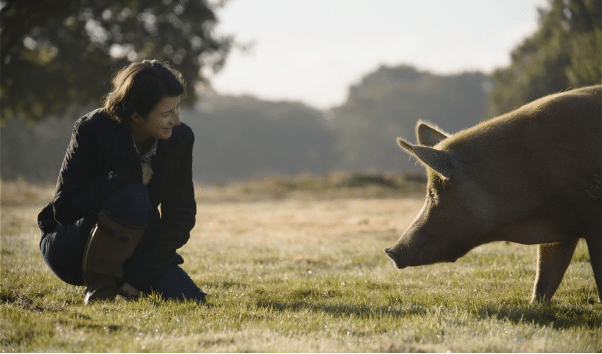





Dir: David Allen | UK Doc 75′
Pigs can swim!
The English countryside is one of the most depleted in the world in terms of wildlife; a quarter of our beloved mammals now face extinction in a dying landscape. But there is good news, according to this uplifting new eco documentary from David Allen. His stunning film shows that given the right conditions nature can heal itself. And Isabella Tree and her husband Charlie Burrell have proved this with their regenerative rewilding project in Southern England. Allen bases his film on Isabella’s 2018 book ‘Wilding: The Return of Nature to a British Farm’
Wilding documents a transformation that started fifteen years ago in Knepp, a crenellated country estate 19th castle in Horsham, deepest Sussex. When the young farming couple took over Knepp the surrounding farmland was drenched in chemicals and the oaks were dying. A fizzing underground chemical circuit board had destroyed the vital microrrhizal network that allows plants – and particularly native oak trees – to thrive and enrich the ground with organic life to grow nutritious crops and re-create a landscape that been missing since the advent of intensive agriculture after the Second World War. Despite their best farming efforts, Charlie and Isabella knew a new approach was needed.
In 2002 ‘Countryside Stewardship’ funding allowed the couple to roll out a an avant garden conservation project where nature ‘takes over’. They took the advice of Dutch ecologist and pioneer Dr Frans Vera and it was revealing: a natural landscape is not devoid of animals, but actually driven by herds of ancient wild stock that hold back the trees and assist in rebalancing the environment. So gradually the ancient animals were introduced to Knepp; but would they survive and breed?.
The task ahead was going to be fraught with difficult because the Knepp’s radical approach was weighted by so much public negativity. Intensive farming methods are hard-wired into the national psyche. To their dismay, the couple’s presentation was greeted with horror and anger by local farmers: “how are we going to feed the population without intensive farming?”. Many others felt the ‘privileged’ couple threatened to destroy the nature of the British landscape – as we know it – even allowed ragwort to prosper. ‘Creeping thistle’ is the enemy of farmers and is strictly controlled with pesticides – but more on that later.
With government support, the project eventually got under-way, and ancient breeds of wild native animals were allowed to run free and roam: Tamworth pigs, Exmoor ponies, red deer and longhorn cattle. Farm animals get fed but this new stock was going to have to fend for themselves. Surprisingly the beasts not only survived, but thrived. Freed from the restrictive practices of intensive farming, the animals reverted to their original natures, pigs even swam and dived for food. In fact, the Tamworth pigs seem to be the smartest, we watch as the sow nourishes herself with nettles for iron after giving birth to her first litter in the Spring.
Gradually wildlife returned to the land and it became a haven for near extinct and dwindling species: Turtle doves, nightingales and field mice numbers were boosting. Today, Knepp has the highest density of songbirds in Britain. And it’s the large grazing animals that provide the space needed to foster a habitat for thousands of native species. Beavers have since arrived to control the wetlands – since being granted a government licence – so no more floods that can cause havoc each year.
Eleven million butterflies headed to Britain in 2009 and those landing on the Knepp estate fed off the creeping thistle and devoured it. The following year no creeping thistle came back to the land. Charlie analysed the soil and cowpats and made the discovery that bugs that had been wiped out when the land was turned over to intensive farming had since returned. Now 19 different species of earthworms enrich the soil and provide the rich nutrients that eventually ends up in our food. Sixteen years into the project, Isabella introduced a pair of storks into Knepp – and the birds bred and provided stork chicks, for the first time in 600 hundred years.
But the question still stands. How can this small project restore Britain’s natural ecosystem and provide nutritious food for the growing population? Well that’s the subject for another film but the findings are positive. We can save the world if we really want to, thanks to Isabella and Charlie’s brave experiment. @MeredithTaylor
NOW OUT IN CINEMAS